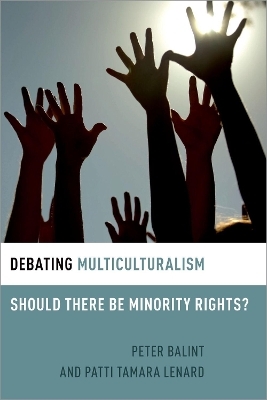
Debating Multiculturalism
Oxford University Press Inc (Verlag)
978-0-19-752838-9 (ISBN)
Around the world, we see failing attempts at migrant integration, persistent religious intolerance and racial and ethnic discrimination, resurgent national minorities, emboldened majorities, permanent minorities, continuing social isolation, and increasing extremism, including in the form of white nationalism. But is multiculturalism the solution to these problems or does it just make them worse?
In this for-and-against book, two prominent scholars of multiculturalism put forward different answers to this important question. While Patti Tamara Lenard argues for minority rights as both the consequence of a right to culture and a way to redress the effects of nation-building, Peter Balint rejects minority rights altogether, instead arguing for a re-imagined liberal neutrality. This theoretical disagreement plays out in real-world policy disagreement. Lenard, for example, argues strongly in favor of exemptions from general rules for minority cultures including the right of Sikhs to be exempt from helmet laws, and for Jews and Muslims to be exempt from bans on male circumcision. She also defends the right of minority cultures to have government-supported separate spaces. Balint, on the other hand, argues directly against these types of exemptions and government support. He is opposed to any form of differentiation based on culture, religion, or ethnicity. The book uses a wide range of real-world examples to demonstrate their significant theoretical disagreement, and to recommend very different policy proposals.
Peter Balint is a Senior Lecturer in International & Political Studies at UNSW Canberra. His most recent book Respecting Toleration: Traditional Liberalism and Contemporary Diversity (Oxford University Press, 2017), was awarded an APSA CRISP Prize in 2018. His research is in political theory and is primarily focussed on the principles for diversity, including respect, toleration, neutrality, and social cohesion. He is regularly asked to consult government on issues of migration, multiculturalism, and citizenship. Patti Tamara Lenard is Professor of Applied Ethics in the Graduate School of Public and International Affairs, University of Ottawa.. She is the author of Trust, Democracy and Multicultural Challenges (Penn State, 2012) and How Should Democracies Fight Terrorism? (Polity, 2020). She is active in the fields of political theory of migration, counter-terrorism, and democracy more generally. In Ottawa, she runs a small community organization called Rainbow Haven, which sponsors, settles and advocates for LGBTQ refugees and asylum seekers.
Introduction: Multiculturalism and Minority Rights
Peter Balint & Patti Tamara Lenard
PART I: Pro Multiculturalism
Patti Tamara Lenard
Chapter 1: Introduction to Part I
Chapter 2: What is Culture? Why Political Inclusion?
Chapter 3: Cultural Claims and Political Inclusion
Chapter 4: Cultural Preservation and Multicultural Accommodation
Chapter 5: Non-Interference and Political Inclusion
Chapter 6: Shared Public Culture in Diverse States
PART II: Against Multicultural Minority Rights
Peter Balint
Chapter 7: Introduction to Part II
Chapter 8: We are All Neutralists Now!
Chapter 9: Neutrality without Minority Rights
Chapter 10: National Minorities, Indigenous Peoples, and Historical Injustice
Chapter 11: Multiculturalism and the Demands on Citizens
Chapter 12: Conclusion to Part II
Part III: Responses
Chapter 13: Response to Balint
Culture not Colanders: Why Neutralism Fails to Respond Effectively to the Challenges of Cultural Diversity
Patti Tamara Lenard
Chapter 14: Response to Lenard
Multiculturalism without Minority (or Majority) Rights
Peter Balint
| Erscheinungsdatum | 07.02.2022 |
|---|---|
| Reihe/Serie | Debating Ethics |
| Verlagsort | New York |
| Sprache | englisch |
| Maße | 211 x 140 mm |
| Gewicht | 363 g |
| Themenwelt | Geisteswissenschaften ► Philosophie ► Ethik |
| Sozialwissenschaften ► Politik / Verwaltung ► Vergleichende Politikwissenschaften | |
| ISBN-10 | 0-19-752838-4 / 0197528384 |
| ISBN-13 | 978-0-19-752838-9 / 9780197528389 |
| Zustand | Neuware |
| Haben Sie eine Frage zum Produkt? |
aus dem Bereich


